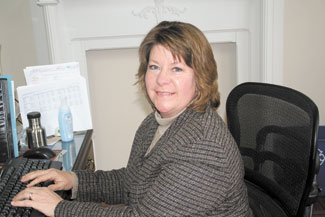Sayre Focuses on 21st Century Learning Skills
 Sayre School’s past and future are evident in the architecture that fronts North Limestone in downtown Lexington.
Sayre School’s past and future are evident in the architecture that fronts North Limestone in downtown Lexington.
The venerable administration building reflects the school’s core values and station as the city’s oldest school – Sayre was founded in 1854.
Just up the block sits the school’s high school – the epitome of cutting edge architecture that mirrors the school’s commitment to a 21st-century perspective.
As much as school officials respect Sayre’s past, their gaze is always forward.
“We have continuity at Sayre, but we are not the same educational institution we were 20 years ago,” said Dawn Jenkins Klus, the Associate Head of School for Academics who has been at Sayre for 19 years. “We are always undergoing renewal.”
Klus is heading the latest renewal project as the school prepares a comprehensive plan that examines its incorporation of 21st century learning skills into the curriculum.
Those skills are:
* Critical thinking, problem-solving, research and information fluency
* Communication (writing, public speaking, performance, visual media)
* Collaboration and leadership
* Creativity and innovation
* Technology fluency
* Character (integrity, respect, compassion, initiative, resilience, willing-ness to take intellectual risks).
The faculty has been divided into three groups (preschool-second grade, third-seventh grade, eighth-12th grade) and given three tasks:
* Provide an assessment of Sayre’s curriculum with respect to 21st century skills in each academic discipline.
* Identify gaps between the current status and new goals.
* Create professional development plans for reaching those goals.
“We are educating the leaders of tomorrow,” Klus said. “Our task is to help students develop the skills to analyze and creatively address modern problems.”
Sayre already incorporates many of these 21st century skills into its curriculum. Char-acter development has always been part of Sayre, and in technology the school remains ahead of the curve.
“All of our high school students bring laptops to school, and we encourage our middle school students to bring iPads or whatever technology they need,” Klus said.
Similar to many small liberal arts colleges, Sayre students utilize both Mac and Windows platforms, enhancing technological fluency.
The whole point is to prepare students for the future.
Said Klus: “Our students need to be ready for the university of tomorrow rather than the university of yesterday.”

